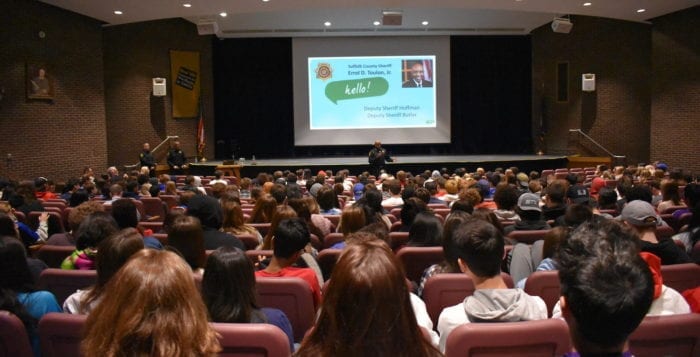Suffolk sheriff tells PJ students to “say something” about potential shootings

When Suffolk County Deputy Sheriff Brian Butler asked Port Jefferson High School students whether they felt safe in school, approximately half of the assembled ninth- to 12th-graders languidly raised their hands.
The county sheriff’s office has been conducting violence prevention classes with districts called Say Something as part of the national nonprofit Sandy Hook Promise campaign to mitigate school shootings. The presentation that was made to Port Jefferson middle and high schoolers Feb. 26 asked students to learn the warning signs of a person who may commit a violent act in or out of school, and then tell a teacher, school official or another adult about it.
“We’re not going to completely prevent a school shooting, but we can do a much better job,” Butler said.
“We’re not going to completely prevent a school shooting, but we can do a much better job.”
— Brian Butler
The deputy sheriff said one of the issues he has seen with kids being unwilling to come to adults with these comments is the aura of being called out as a “snitch.”
“We live in this, ‘I don’t want to be a snitch’ culture,” he said. “That’s a prison term.”
Butler said there were a number of warning signs students should look out for among their peers, including withdrawing from others, bullying, excessive anger, thoughts or plans of harming one’s self or others or other significant personality changes. Though the most obvious sign is a social media post, which in past shootings, shooters have used to explicitly announce their intentions days before the tragedies.
The department pointed to a recent event in Brentwood where Suffolk County police arrested a 16-year-old student Feb. 24 who allegedly posted a message on Snapchat saying he would be “shooting up the Brentwood Freshman Center” the following day. A student took a screen capture of the Snapchat message and sent it to officials, who arrested the young man on charges of making a terroristic threat.
While some could look at those warning signs and see a young person going through the normal emotional swings of becoming an adult, the deputies said the point of the presentation was to increase student’s awareness and to lighten the stigma of speaking up.
“This is not a paranoia thing,” Deputy Sheriff Keith Hoffman said.
Sandy Hook Promise was formed in part by parents of children involved in the Newtown, Connecticut, school shooting in 2012, where a 20-year-old man fatally shot six adults and 20 elementary school children, all of whom were 7 years old or younger. The nonprofit announced a partnership with the county sheriff’s office in August 2018. Since then, Butler said the department has been to more than 10 school districts and spoken in front of hundreds of children.
“It may not happen here, but it might happen somewhere else you might be.”
— Errol Toulon Jr.
While the sheriff deputies said the likelihood of a school shooting happening in Port Jefferson is slim, Sheriff Errol Toulon Jr. (D) said the specter of the possibility hangs over students as they continue in school and even into higher education.
“It may not happen here, but it might happen somewhere else you might be,” Toulon said.
Still, many schools across Long Island have increased security measures. Port Jeff Superintendent Paul Casciano said the 2018-19 school budget included increases for the number of security staff, as well as funds for new security vestibules in both the elementary school and the combined high school and middle school building. These projects are currently awaiting review by New York State’s Department of Education and won’t likely be completed until this summer or later.
Other districts have taken the step of hiring armed guards for their schools, such as Mount Sinai and Miller Place, but Casciano said the point when security becomes overwhelming for students is when “kids feel like they’re going into a prison.”
“It’s a community decision,” he added.






